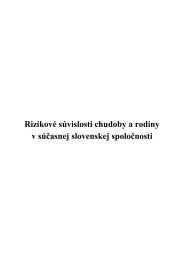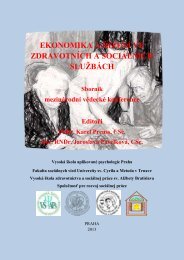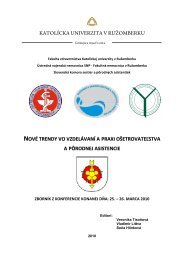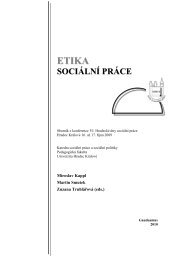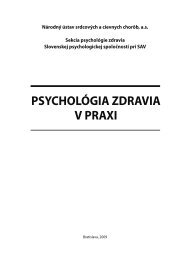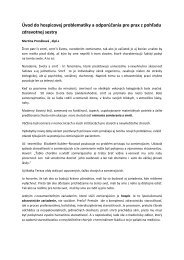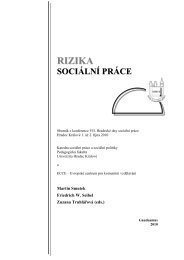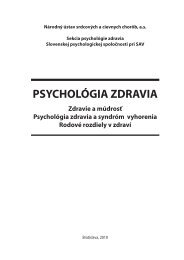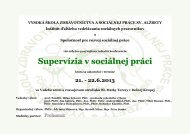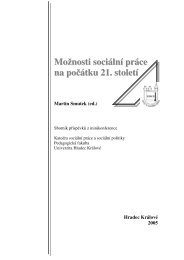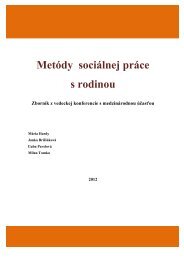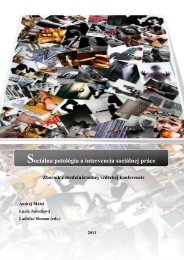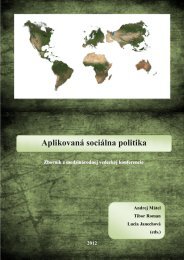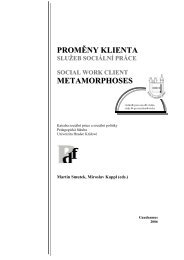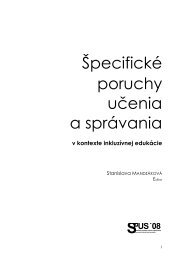Zmena klÃmy â možný dopad (nielen) na obyvateľstvo - Prohuman
Zmena klÃmy â možný dopad (nielen) na obyvateľstvo - Prohuman
Zmena klÃmy â možný dopad (nielen) na obyvateľstvo - Prohuman
Create successful ePaper yourself
Turn your PDF publications into a flip-book with our unique Google optimized e-Paper software.
• The ‘western’ realm was promoted in the past through a neoliberal market economy;<br />
but below the surface the authors recognized the gradual emergence of what<br />
they called a living life-based economic realm – which is basically a creative revisiting<br />
of the Anglo-Saxon economic model with a strong focus on ecology and<br />
sustai<strong>na</strong>bility.<br />
With the help of this model, Lessem and Schieffer classified the series of new<br />
economic thinking and practice, related to and building on <strong>na</strong>ture and community,<br />
culture and spirituality, science and technology, and different ways of looking<br />
at fi<strong>na</strong>nce and enterprise.<br />
They were surprised about the wealth of thinking and practise we can find in<br />
the world; the biggest surprise of all was the wealth of economic thinking to be<br />
found at the centre: Indigenous economic thinking, Catholic Economics, Islamic<br />
Economics, Buddhist Economics, and on more generally humanistically oriented<br />
approaches to economics, among others. This led to the articulation of – what<br />
they call – a moral economic core. Such a moral economic core is related to the<br />
innermost value base to be found in each society and is either related to religion<br />
and/or secular, humanist articulation of such a value base.<br />
The Grameen banking group in Bangladesh, established by the Nobel Prize<br />
Winner Muhammad Yunus, the Sarvodaya Shramada<strong>na</strong> Movement (grassroots<br />
organization) in Sri Lanka, Mondragon Corporation – Cooperative in Basque<br />
country, the Sekem community enterprise in Egypt in Egypt, founded by Ibrahim<br />
Abouleish, the winner of Alter<strong>na</strong>tive Nobel Prize, the Canon corporation in<br />
Japan, Cradle to Cradle (C2C) Concept, eco communes, Global Alliance for Banking<br />
on Values (GABV) and Triodos Bank, sustai<strong>na</strong>ble enterprises (such as the US<br />
modular carpet manufacturer Interface), the concept of a steady state economy,<br />
and several others … these models are economically successful (many already for<br />
decades), socially equitable and environmentally responsible. In the light of the<br />
Rio+20 Summit, they could be regarded as living, successfully operating examples<br />
of inclusive green economy.<br />
Sekem, Grameen, Canon, Mondragon, Interface and Sarvodaya are the most<br />
representative cases for each of the Four Worlds and the moral economic core.<br />
Each of these cases is completely different in the sense that Mondragon remains<br />
archetypically Northern despite Western, Eastern, and Southern elements, while<br />
Sarvodaya remains archetypically Eastern despite involving Northern, Southern,<br />
and Western traits. The origi<strong>na</strong>lity of each initiative is that it both remains contextually<br />
rooted and takes crucial elements from other moral economic cores and<br />
other economic wisdom paths.<br />
135



